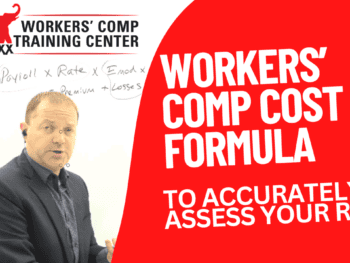We all know employers are required to carry workers’ compensation insurance in nearly every state (except Texas) and workers’ are covered by WC benefits when injured in their workplace. However, believe it or not, there are two basis areas where workers are NOT covered by WC and when injuries are not covered by workers' compensation laws.
(Note: This discussion is general, may not and is not intended to apply to all jurisdictions, but generally will apply to most jurisdictions.)
Workers Who Are Not Covered:
1. Sole proprietors.
2. Partners where there are no other employees.
3. One- and two-person corporate officers where there are no other employees providing services to the corporation.
4. Real estate sales people who sign a contract with their broker stating they are independent contractors.
5. Insurance agents or insurance brokers who sign a contract stating they are independent contractors.
6. Newspaper delivery carriers who sign a contract stating they are independent contractors. See: Calling Employees Independent Contractors, et al at https://blog.reduceyourworkerscomp.com/2009/07/calling-employees-independent-contractors-to-avoid-work-comp/#axzz0hbuXfze3
7. Very small employers who have fewer than the minimum number of employees (three to five employees in most states).
8. Employees who are covered by federal workers’ compensation insurance — those covered by the Longshoreman & Harbor Workers Act, the Jones Act, interstate railroad employees, and federal government employees.
9. Clergy and other religious members performing religious duties.
10. Teachers employed solely in a teaching capacity at religious, charitable or other non-profit educational institution.
11. Employees engaged solely in a non-manual capacity at religious, charitable or other non-profit educational institution.
12. Persons receiving charitable aid from charitable or religious organization who perform services to the charitable or religious organization in exchange for the aid.
13. The minor children or spouse of a farmer who are working for the farmer.
14. Some agricultural workers in some jurisdictions.
15. People performing yard work for a one family residence on an irregular basis.
16. Part time domestic employees working in a private home.
17. Casual workers defined as a worker whose work is not continuous or whose work is below the stated monetary threshold.
18. Employees of foreign governments.
19. Employees of Native American nations who have opt out of the work comp system.
20. Volunteers at non-profit charitable organization or volunteers for religious groups who receive no compensation of any kind.
Claims That Are Not Covered:
1. Most jurisdictions have terminology in their work comp statutes like “in the course of employment” or “arising out of the employment.” This is meant to establish a link between the work done for the employer and the injury. There must be a causal connection between the injury and the employment. If not, then the injury is not a work comp claim.
2. The injury must occur during the work period and at a location or place where the employee would reasonably be performing the duties of his employment. If not, then the injury is not a work comp claim.
3. In some states (and all states should make this a law) an injury due to the employee being intoxicated due to alcohol or illegal drugs.
4. If the injury occurs during a scheduled lunch break or rest break it will not be covered in most jurisdictions (there are jurisdictional exceptions). If the employer requires the breaks to be taken “in place” and the employee is not free to leave the work station, then the injury is normally covered by work comp.
5. Most states do not allow purely psychological or emotional injuries to be covered by work comp if there is not an underlying physical injury first. If the employee is stressed from the everyday pressures of doing the job, it is usually not compensable under work comp. If the employee is stressed because of worry over the possibility of not recovering completely from the injury, then psychological counseling is covered by work comp.
6. An injury resulting from horseplay, rough housing or practical jokes is normally not covered by work comp if you are the perpetrator of the horseplay, rough housing or practical joke. If you are the innocent victim of such activities and suffer an on the job injury, it is covered by work comp.
7. Injuries resulting from fights at work are not covered when the fight is not related to the employment. If two employees get in a fight over their favorite hockey teams, their resulting injuries are not covered by workers compensation. If an employee assaults a supervisor due to the supervisor's poor management skills, the resulting injuries would be covered by work comp.
8. When an employee works at a fixed location, injuries occurring during travel to and from work are normally not covered by work comp.
As with most of the injuries that are not covered by work comp, there are exceptions. The employee who is running an errand for the employer, for example dropping off mail at the post office, is covered. If the employee is “on-call” and is traveling to work outside of the regular schedule, the employee would be covered for a job related injury.
Injuries occurring during after work activities that are not company sanctioned are not covered. For instance, the employees of the shipping department arrange a co-ed softball game with the employees in the mail room without any company sanctioning or involvement in the arrangement. An injury occurs as the employee slides into second base. No work comp coverage. If the employer arranged the softball game for the two groups to compete, then work comp coverage would apply, but as the employees arranged the game and were not in the course of their employment, work comp would not apply. (workersxzcompxzkit)
Summary:
The employer’ workers’ compensation insurance covers almost all injuries occurring at work. However, the risk manager and your company's work comp claims coordinator should learn all the exceptions in their state as to when work comp coverage applies. They should know when the worker is not covered by the workers' compensation laws and when the injury is not covered by workers' compensation laws.
Author Robert Elliott, executive vice president, Amaxx Risks Solutions, Inc. has worked successfully for 20 years with many industries to reduce Workers' Compensation costs, including airlines, health care, manufacturing, printing/publishing, pharmaceuticals, retail, hospitality and manufacturing. He can be contacted at: Robert_Elliott@ReduceYourWorkersComp.com or 860-553-6604.
Podcast/Webcast: Claim Handling Strategies
Click Here:
http://www.workerscompkit.com/gallagher/podcast/ Claim_Handling_Strategies/index.php
Do not use this information without independent verification. All state laws vary. You should consult with your insurance broker or agent about workers' comp issues.
©2010 Amaxx Risk Solutions, Inc. All rights reserved under International Copyright Law. If you would like permission to reprint this material, contact Info@ ReduceYourWorkersComp.com.


























